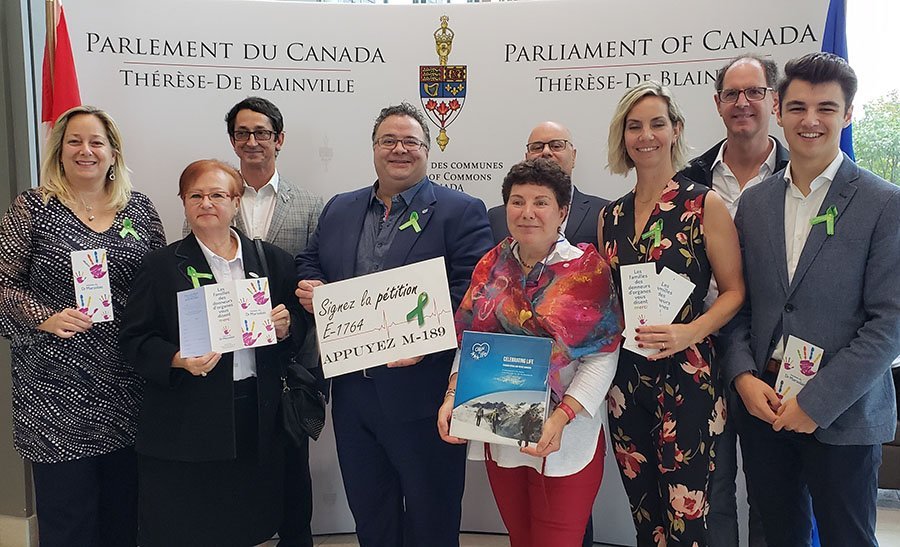
Renata Isopo
People on missions are rarely defeated, although sometimes delayed in reaching objectives. At a media conference last autumn, speaking for everyone in need of organ/tissue transplants across Canada, Federal Member of Parliament (MP) Ramez Ayoub (Thérèse-De Blainville) strongly stressed urgency of House of Commons Motion 189, specifically aimed at these medical initiatives.
Recently, to mark National Organ and Tissue Awareness Week, Ayoub re-iterated his commitment to the cause. “(This) is an opportunity to lift the veil and encourage people to sign the Régie de l’assurance maladie du Québec’s Consent to Organ and Tissue Donation form. The goal is information and awareness, hence the importance of campaigns and national weeks. I care deeply about this issue. That is why I introduced Motion M-189, calling upon the federal government to reaffirm its commitment and to encourage organ/tissue donations in Canada by supporting national efforts, in collaboration with provincial/territorial authorities and stakeholders” says Ayoub, in a press release. “I am very proud to see, through an announcement in support of Motion M-189, that our work has paid off. The Honorable Ginette Petitpas Taylor, Minister of Health, announced April 8, additional $3.4 million funding over two years for Canadian Blood Services, to improve organ/tissue donations and transplantation systems.”
This funding, added to $3.58 million provided annually to Canadian Blood Services by Health Canada, will support public education and awareness campaigns, professional education, development/implementation of best practices, and system improvements to promote effective and timely access to care.
Budget projections – 2019-2020
Ayoub is gratified for attention paid by Federal Finance Minister Morneau to this cause that’s so close to his heart, citing that in the recently tabled budget Ottawa proposes to provide Health Canada with $36.5 million over five years, $5 million annually, towards developing national data and performance systems for organ donation/transplantation, in collaborative efforts with provincial/territorial partners.
The goal, says Ayoub, is to improve data consistency and quality, allowing more donors and recipients to be effectively matched, ensuring that Canadians have timely and effective access to organ transplant opportunities. “It’s more important than ever for citizens to talk to loved ones, friends, and work colleagues about organ donation,” he pleads.
What can we do to help?
At the September press conference, Ayoub introduced several important supporters. Chaîne De Vie, the non-profit Organ Donation National Educational Awareness Project is an integral participant. According to Ayoub, the Québec-based organization widely promotes understanding and importance of organ/tissue donations.
Prominent individuals strengthened Ayoub’s message. Dr. Pierre Marsolais, internal specialist and founder of the Regional Center of Organ Donation at Montreal’s Sacré-Coeur Hospital, was transparent about the need to develop better strategies. “Donation and transplants are not sterile medical processes, but personal human deeds, acts which touch people personally, and intimately, giving recipients a new lease on life, enhanced quality living, and new outlooks on humanity.
“In Quebec, 4500 are waiting for donors,” Marsolais told TLN, pointing out that between 2006-2015 donors declined. Wait-time is four years. Québec has the least donors, although augmentation has occurred in recent years. Donors also change their minds, Marsolais acknowledged. Donors’ families need support, and he encourages everyone to share responsibility. “It’s the only way to save lives.”
Chaîne de Vie, central to the mission of informing/sensitizing students on this delicate issue, has an array of people committed to the cause: founder/president Lucie Dumont; Youth Ambassador Tristan LeBlanc; Isabelle Tétrault, daughter of a donor and ambassador to schools; and Johane Michaud, spokesperson for young adults. Organ recipients Joe Hajj and Yves LeBlanc, Carole Du Paul, wife of an organ donor, mayors from several cities, and medical and business associates all strongly support the cause.
Available to all Canadians
“I sincerely believe we must do better for those whose only hope is an organ donation,” Ayoub states, emphasizing that disseminating information within schools and establishing open communication with young people are crucial. Declining organ/tissue availability is a global phenomenon. Canada and Québec face substantial shortages and lives are lost. Reasons include misinformation and reluctance to talk about death, leaving difficult decisions to families unprepared to consent when the time comes. “Although 90% of Canadians favor organ donation, only 20% manifest interest. Unfortunately, 10-15% have consent withdrawn by family at time of death,” Ayoub cautions.
A problem with a cure
All ages can donate – youngest at 48 hours to oldest at 88. Minors need parental consent. Donor families have different stories, such as those of Isabelle Tétrault, Carole De Paul, and Johane Michaud. But all reflect generosity of the human spirit, in time of grief and tragedy, to rise above personal concern to help others. For Isabelle, Carole, and Johane it’s the ultimate gift, the utmost act of human kindness. To give back for gifts received, they are actively involved in promoting Dr. Marsolais’ mission in support of donors and their families, participating in programs that inform through education in hope of more research toward organ/tissue donation.
Saving lives through corporate support
Chain of Life, unique and intergenerational, founded and coordinated by Lucie Dumont, aims to educate high-schoolers on organ/tissue donations, encouraging them to become ambassadors in family discussions. The project unites health and education sectors to save lives.
“It is through teaching units, integrated into English courses, that this project mobilizes. 200 Québec teachers are on board, with potential to reach 100,000 young people province-wide,” Lucie Dumont told TLN.
Values conveyed by Chaîne de Vie encourage young people to demonstrate community commitment by undertaking concrete actions. Privately funded, major supporters are DESJARDINS ($250,000), TELUS ($20,000), and FONDATION ST. HUBERT BBQ ($15,000). Approved by the Quebec Government, the project is accessible to all school boards.
Want to know more? Visit Transplantquebec.ca














